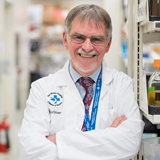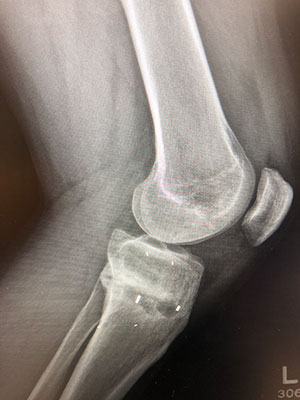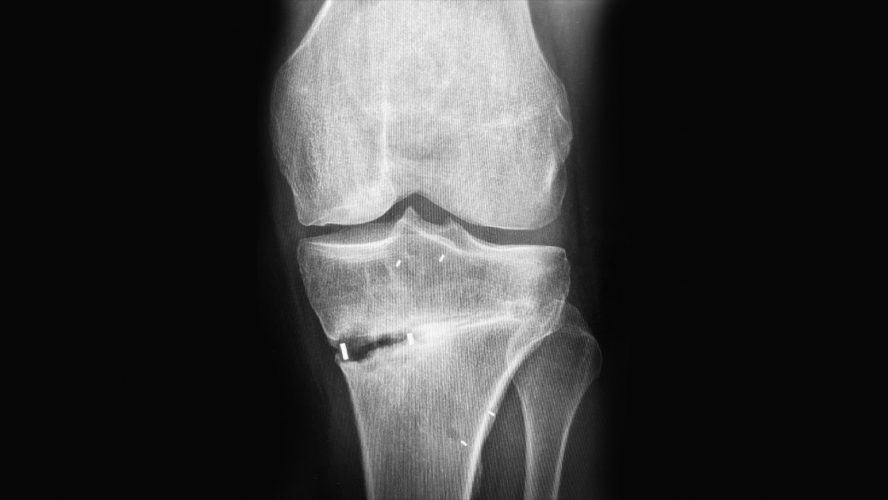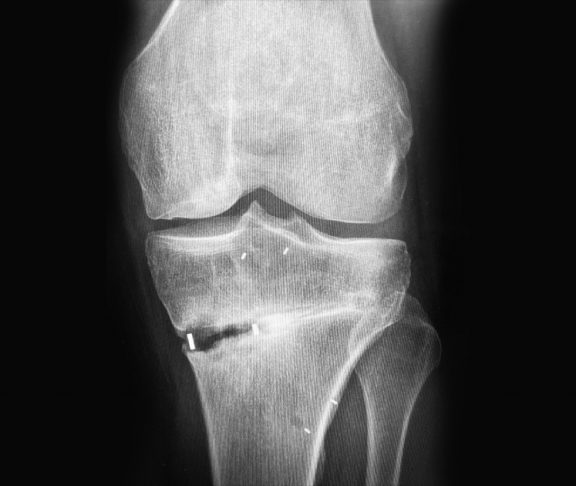
Dr. Duncan Stewart
Executive VP of Research, The Ottawa Hospital

Dr. Mike Pickell
Orthopaedic Surgeon, The Ottawa Hospital
At just 34 years old, Adam, an Ottawa-area heavy machine mechanic, was plagued by unrelenting, and steadily worsening, pain in his knee. Despite trying every non-surgical treatment option available, Adam found himself walking with a cane and unable to work.
The root cause of Adam’s trouble was a missing patch of cartilage, about the size of a loonie, in his knee. “Normally, your knee or any joint is covered in cartilage, but patients like Adam have an area of cartilage that’s defective,” says Dr. Mike Pickell, orthopaedic surgeon with The Ottawa Hospital. “Either it’s been torn off, or it just isn’t there. So there’s an area of the joint that’s just bone on bone.”
With other treatments exhausted, Adam’s only way forward was a procedure known as an osteochondral allograft, a transplant surgery in which a plug of donor bone and cartilage is used to replace the faulty tissue. “It’s a joint preservation procedure rather than a joint replacement procedure,” explains Dr. Pickell. “In fact, the main idea is to prevent someone from needing a complete joint replacement for as long as possible, ideally permanently. Any time you can keep someone’s own body as whole as possible, the better that person is going to do.”
Health research and clinical trials give Canadians access to the latest treatments, before they are approved as standard therapies. Sometimes this early access means the difference between life and death.
Dr. Duncan Stewart, The Ottawa Hospital’s Executive VP of Research
Effective treatment stands on the shoulders of innovative research
When the date of Adam’s surgery arrived, all of the latest medical advancements were brought to bear, many of them developed right here at The Ottawa Hospital where research is wide-ranging; from MRI cartilage sequencing trials that will help diagnose conditions like Adam’s earlier, to cutting edge stem cell research with potential applications across the medical spectrum. And there’s great value to having this research take place here at home. “Canada has an internationally renowned health research community and we need to support it,” says The Ottawa Hospital’s Executive VP of Research, Dr. Duncan Stewart. “The research of today leads to new technologies that fuel the innovative industries and jobs of tomorrow, and we want to keep this in Canada.”
Just as importantly, homegrown research directly benefits Canadian patients. “Health research and clinical trials give Canadians access to the latest treatments, before they are approved as standard therapies,” says Dr. Stewart. “Sometimes this early access means the difference between life and death.”
Same surgery, new methods

Osteochondral allografts have been performed for decades, but Adam’s was an extreme case, needing every advantage modern techniques and technology could provide. “We’ve had improvements in how we extract the cartilage and bone, as well as how we implant it and press-fit it,” says Dr. Pickell. “It has really made a big difference. The rates of infection and rejection have gone down to almost zero as a result.”
In fact, though it’s often first-of-their-kind therapies that steal the headlines, advancements in existing treatments can be even more valuable for their broad and immediate applicability to cases like Adam’s. Thanks to these advancements, and to Dr. Pickell’s expertise, Adam was back on his feet only four weeks after his surgery. By eight weeks, he was riding a bicycle and had said goodbye to the cane. Today, nine months post-surgery, Adam is back to work full-time for the first time in years and feeling great. He’s even kicked his smoking habit, after Dr. Pickell warned him smoking could interfere with the healing process.
The research that drives success stories like Adam’s isn’t easy or cheap, but it is critical and so is donor support. The time and resources we commit to supporting our research institutions today will come back to us tomorrow as both health and wealth. This exciting research is happening at the Ottawa Hospital because Canadians have donated and fundraised to make it happen. “Money spent on research now can not only improve outcomes, but also reduce expenditures in the future,” says Dr. Pickell. “If what we did for Adam means that his knee is now normal for the rest of his life and he never needs a knee replacement or a revision surgery and twenty days in the hospital, then, over his lifespan, this will have been a significant cost-saving procedure.”



